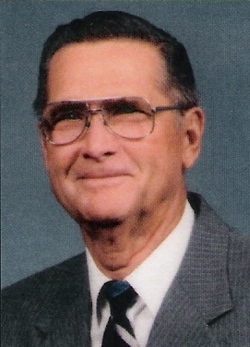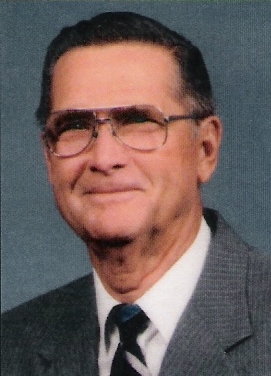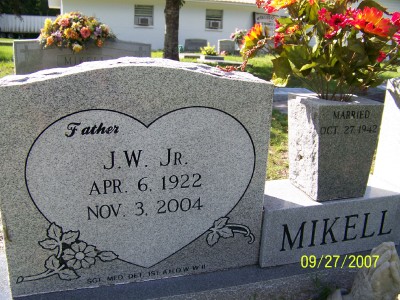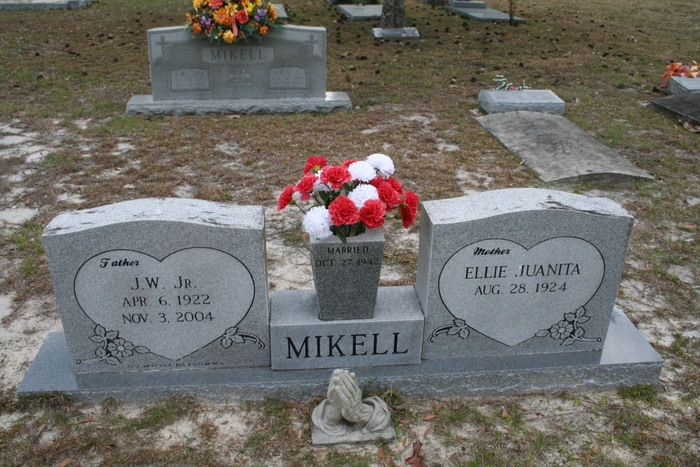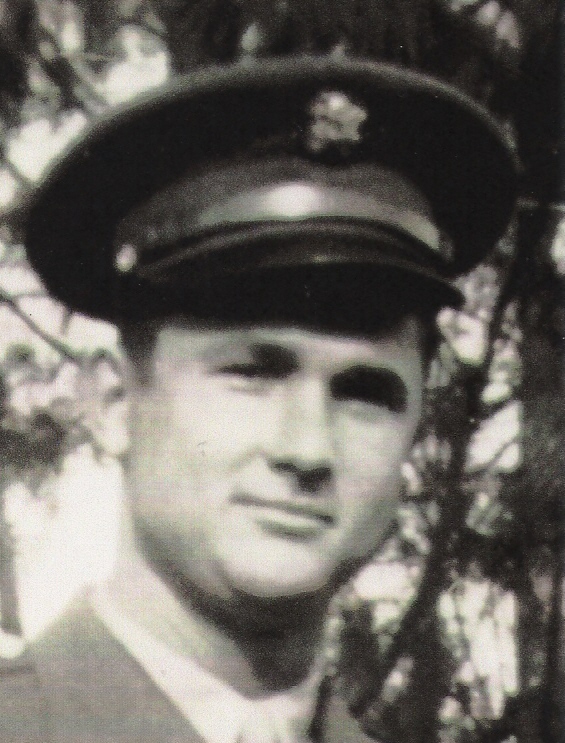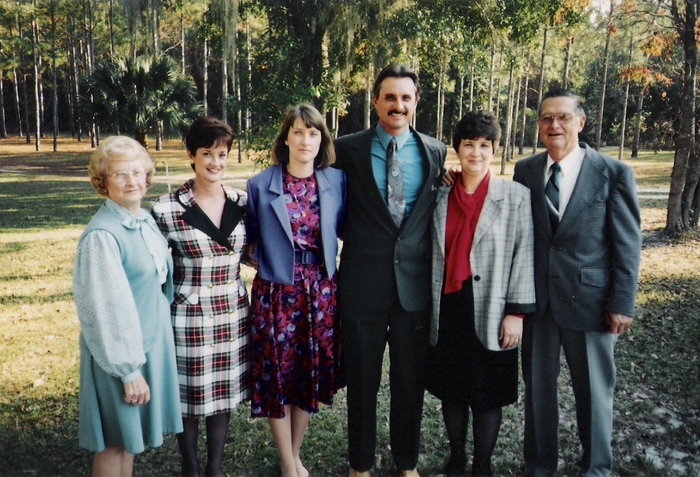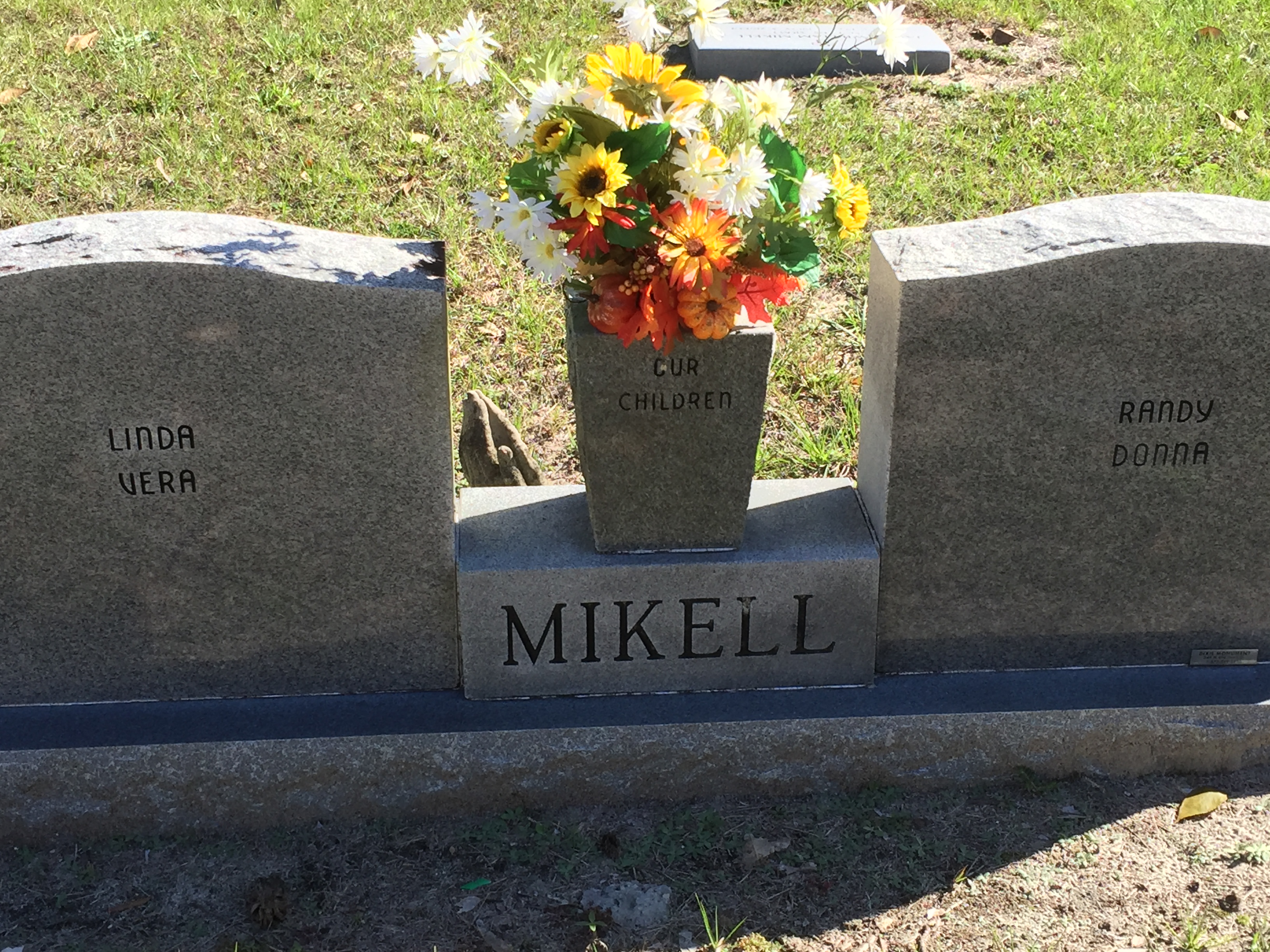After the war, J.W. and Juanita moved back to the First District in Dixie County and purchased about 200 acres of farmland (which adjoined Grandpa and Grandma's property) and a Ford tractor, hoping to make a living doing what he loved best – farming. In November of 1946, their first child Linda was born – 22 months later I came along. With the help of his father, Jim Mikell, they built a house out of rough-cut pine. In the beginning, the house was very rough – the inside walls were unfinished, there was no indoor plumbing, and a fireplace in the living room provided heat. A galvanized wash tub filled with water and heated by the afternoon sun was used for bathing – and don't forget the two-seated outhouse – a small seat for the little folks and a bigger one for grownups. A one-lane dirt road ran along the front of the house. As the years passed by the house began to change. Around 1952, the kitchen was remodeled to include a new Shirley cast-iron porcelain kitchen sink with cabinet and drawers purchased from Western Auto in Branford, Florida. Also from Western Auto, Mom even got a new Sunbeam Automatic Mixmaster to replace the manual hand mixer or egg beater. A bathroom with indoor plumbing was also added. Closets with doors were added in the bedrooms along with new linoleum for the floor. A screened-in back porch was added behind the kitchen for the wringer washing machine and wash tubs. Mom and Grandma spent many hours on the back porch shelling peas and beans by hand for canning. The wash tubs were used to collect the empty pea and bean shells that would be thrown over the back fence to feed the pigs. The fireplace was replaced with a new gas heater. On cold mornings, Dad would carry me into the living room and warm my clothes in front of the heater and get me dressed for the day. Dad worked hard in the fields all day on the old Ford tractor. Every day around noon time, Mom would stand at the edge of the field waving a white dish towel as a signal that lunch was ready. As soon as he had finished lunch, he would put on his tan Army pith helmet and be out on the tractor again until supper time. After working hard in the fields all week, sometimes Dad would drive us to Branford on Saturday night in the black Ford pick-up truck and we would watch the "free show" that would be playing on the side of the drugstore wall. Dad loved farming and being outdoors, but times were tough and then, in 1956, my brother Randy was born. Dad dearly loved his wife and children and was determined to provide the best he could for us.
In 1957, Dad traded in the Ford truck for a 1955 turquoise Chevrolet Bel-Air 4-door hardtop with an AM radio and black rubber flooring and moved the family to Jacksonville where he took a job as a salesman for Atlas Sewing Machine Company. He bought a small 3-bedroom, 1-bath, concrete-block home on the south side of town. That's when we got our first black and white TV set, a telephone, and a new automatic washing machine. Mom was convinced that she would never be able to get our clothes clean with one of those new automatic machines. Mom's treadle Singer sewing machine was replaced with an electric Atlas Deluxe Pink sewing machine. Every other Sunday the family would pile into the Bel-Air and drive to Dixie to visit Grandma and Grandpa. Since they didn't have a telephone, Dad wanted to check on them often and make sure they were okay. By that time, Grandma had finally convinced Grandpa that they should move into our newly remodeled home with all the latest conveniences. Dad had tried to talk Grandpa into moving after we left, but Grandpa had too much pride and refused the offer. Finally, Grandma put her foot down and told Jim they would be moving. Dad tried to replace Grandma's treadle Singer with a new Atlas sewing machine, but she was content with her Singer. Eventually, he was able to convinced Grandma to let him exchange the treadle for an electric foot control.
In late 1959, Dad was offered a manager position with Atlas Sewing Machine Company in Roanoke, Virginia. Dad traded in the Chevrolet for a 1960 Mercury Monterey 4-door hardtop, gold with a white top, AM radio, and carpet on the floor. We drove straight through and arrived in Roanoke late one night. Dad had been telling us about the big star on top of Star Mountain. As soon as we got near Roanoke and he saw the star he wanted to drive up immediately. We finally convinced him that we were too tired after riding all day and we would wait and see it later. Every Sunday afternoon we would go for a ride in the Blue Ridge Mountains or drive up to the top of Star Mountain. We were only there for seven months, but we must have made his life miserable during those seven months. There was record-level snowfall that winter and we were not used to that. I think we begged him every day to move back to Florida. He finally gave in and we returned to Jacksonville in the summer of 1960 and Dad went back to his old job as a salesman. He was determined to have his own business. So, in 1961, we moved to Gainesville and he founded the National Sewing Machine Service Company. It was originally located downtown on Main Street, one block from the old post office (now the Hippodrome Theater). The following year, my sister Donna was born in Alachua General Hospital.
Shortly after moving to Gainesville, Dad put the farm in Dixie up for sale. I guess God had other plans and the farm never sold. Dad's business continued to grow and he soon moved into a larger building near the corner of West University Avenue and 6th Street in Gainesville, and also opened a store in Palatka and another in Fort Walton Beach. The following year, the family moved into a brand new 4-bedroom, 2-bath, brick home just one block off NW 34th Street. After years of driving Mom and us kids around to do all the shopping, Dad decided it was time for Mom to start driving. He went out and bought Mom her very own car – a 1962 metallic green Plymouth Valiant – it looked like a big green frog. Mom got her driver's license and is still on the road today.
After all those years, Dad still had farming in his blood and longed to be back in Dixie County. So, in 1972, after Linda and I had married and moved away, Dad and Mom sold the house in Gainesville and built a new house on the farm. Dad continued the daily commute to his business in Gainesville until he decided to retire in 1978. In the late 1980's, he founded A-1 Sewing Machine and Vacuum Center in Gainesville which he later sold. At Christmas that year, Dad and Mom gave their three daughters and a daughter-in-law a new Janome Dial-N-Sew Model 772 sewing machine. A-1 is still in business today and located in the Thornebrook Village at NW 43rd Street.
In his retirement, he enjoyed raising cattle and was a member of the Cattlemen's Association. He loved the outdoors and was always doing something on his tractor and always had a beautiful vegetable garden. Dad and Mom worked together freezing the vegetables from the garden, and now they were using an electric pea sheller. He enjoyed hunting with his grandsons and fishing with Juanita and was a member of the Dixie Hunting Club. He was also a life-long member of McCall's Chapel United Methodist Church in Hatchbend, and a master Mason of the Joppa Lodge 4 in Fletcher. J.W. and Juanita celebrated their 62nd Wedding Anniversary just one week before he passed away at home in the early morning on Wednesday, November 3, 2004. J.W. loved God, America, and his Family with all his heart.
Today, Randy lives in the house that Dad and Grandpa built back in the 1940's, but you would hardly recognize it now. The fields that Dad once plowed are now planted in pine trees. And the one-lane dirt road that ran along the front of the house has been replaced by a paved two-lane road and officially named "Jim Mikell Road." – That's my Grampa!
After the war, J.W. and Juanita moved back to the First District in Dixie County and purchased about 200 acres of farmland (which adjoined Grandpa and Grandma's property) and a Ford tractor, hoping to make a living doing what he loved best – farming. In November of 1946, their first child Linda was born – 22 months later I came along. With the help of his father, Jim Mikell, they built a house out of rough-cut pine. In the beginning, the house was very rough – the inside walls were unfinished, there was no indoor plumbing, and a fireplace in the living room provided heat. A galvanized wash tub filled with water and heated by the afternoon sun was used for bathing – and don't forget the two-seated outhouse – a small seat for the little folks and a bigger one for grownups. A one-lane dirt road ran along the front of the house. As the years passed by the house began to change. Around 1952, the kitchen was remodeled to include a new Shirley cast-iron porcelain kitchen sink with cabinet and drawers purchased from Western Auto in Branford, Florida. Also from Western Auto, Mom even got a new Sunbeam Automatic Mixmaster to replace the manual hand mixer or egg beater. A bathroom with indoor plumbing was also added. Closets with doors were added in the bedrooms along with new linoleum for the floor. A screened-in back porch was added behind the kitchen for the wringer washing machine and wash tubs. Mom and Grandma spent many hours on the back porch shelling peas and beans by hand for canning. The wash tubs were used to collect the empty pea and bean shells that would be thrown over the back fence to feed the pigs. The fireplace was replaced with a new gas heater. On cold mornings, Dad would carry me into the living room and warm my clothes in front of the heater and get me dressed for the day. Dad worked hard in the fields all day on the old Ford tractor. Every day around noon time, Mom would stand at the edge of the field waving a white dish towel as a signal that lunch was ready. As soon as he had finished lunch, he would put on his tan Army pith helmet and be out on the tractor again until supper time. After working hard in the fields all week, sometimes Dad would drive us to Branford on Saturday night in the black Ford pick-up truck and we would watch the "free show" that would be playing on the side of the drugstore wall. Dad loved farming and being outdoors, but times were tough and then, in 1956, my brother Randy was born. Dad dearly loved his wife and children and was determined to provide the best he could for us.
In 1957, Dad traded in the Ford truck for a 1955 turquoise Chevrolet Bel-Air 4-door hardtop with an AM radio and black rubber flooring and moved the family to Jacksonville where he took a job as a salesman for Atlas Sewing Machine Company. He bought a small 3-bedroom, 1-bath, concrete-block home on the south side of town. That's when we got our first black and white TV set, a telephone, and a new automatic washing machine. Mom was convinced that she would never be able to get our clothes clean with one of those new automatic machines. Mom's treadle Singer sewing machine was replaced with an electric Atlas Deluxe Pink sewing machine. Every other Sunday the family would pile into the Bel-Air and drive to Dixie to visit Grandma and Grandpa. Since they didn't have a telephone, Dad wanted to check on them often and make sure they were okay. By that time, Grandma had finally convinced Grandpa that they should move into our newly remodeled home with all the latest conveniences. Dad had tried to talk Grandpa into moving after we left, but Grandpa had too much pride and refused the offer. Finally, Grandma put her foot down and told Jim they would be moving. Dad tried to replace Grandma's treadle Singer with a new Atlas sewing machine, but she was content with her Singer. Eventually, he was able to convinced Grandma to let him exchange the treadle for an electric foot control.
In late 1959, Dad was offered a manager position with Atlas Sewing Machine Company in Roanoke, Virginia. Dad traded in the Chevrolet for a 1960 Mercury Monterey 4-door hardtop, gold with a white top, AM radio, and carpet on the floor. We drove straight through and arrived in Roanoke late one night. Dad had been telling us about the big star on top of Star Mountain. As soon as we got near Roanoke and he saw the star he wanted to drive up immediately. We finally convinced him that we were too tired after riding all day and we would wait and see it later. Every Sunday afternoon we would go for a ride in the Blue Ridge Mountains or drive up to the top of Star Mountain. We were only there for seven months, but we must have made his life miserable during those seven months. There was record-level snowfall that winter and we were not used to that. I think we begged him every day to move back to Florida. He finally gave in and we returned to Jacksonville in the summer of 1960 and Dad went back to his old job as a salesman. He was determined to have his own business. So, in 1961, we moved to Gainesville and he founded the National Sewing Machine Service Company. It was originally located downtown on Main Street, one block from the old post office (now the Hippodrome Theater). The following year, my sister Donna was born in Alachua General Hospital.
Shortly after moving to Gainesville, Dad put the farm in Dixie up for sale. I guess God had other plans and the farm never sold. Dad's business continued to grow and he soon moved into a larger building near the corner of West University Avenue and 6th Street in Gainesville, and also opened a store in Palatka and another in Fort Walton Beach. The following year, the family moved into a brand new 4-bedroom, 2-bath, brick home just one block off NW 34th Street. After years of driving Mom and us kids around to do all the shopping, Dad decided it was time for Mom to start driving. He went out and bought Mom her very own car – a 1962 metallic green Plymouth Valiant – it looked like a big green frog. Mom got her driver's license and is still on the road today.
After all those years, Dad still had farming in his blood and longed to be back in Dixie County. So, in 1972, after Linda and I had married and moved away, Dad and Mom sold the house in Gainesville and built a new house on the farm. Dad continued the daily commute to his business in Gainesville until he decided to retire in 1978. In the late 1980's, he founded A-1 Sewing Machine and Vacuum Center in Gainesville which he later sold. At Christmas that year, Dad and Mom gave their three daughters and a daughter-in-law a new Janome Dial-N-Sew Model 772 sewing machine. A-1 is still in business today and located in the Thornebrook Village at NW 43rd Street.
In his retirement, he enjoyed raising cattle and was a member of the Cattlemen's Association. He loved the outdoors and was always doing something on his tractor and always had a beautiful vegetable garden. Dad and Mom worked together freezing the vegetables from the garden, and now they were using an electric pea sheller. He enjoyed hunting with his grandsons and fishing with Juanita and was a member of the Dixie Hunting Club. He was also a life-long member of McCall's Chapel United Methodist Church in Hatchbend, and a master Mason of the Joppa Lodge 4 in Fletcher. J.W. and Juanita celebrated their 62nd Wedding Anniversary just one week before he passed away at home in the early morning on Wednesday, November 3, 2004. J.W. loved God, America, and his Family with all his heart.
Today, Randy lives in the house that Dad and Grandpa built back in the 1940's, but you would hardly recognize it now. The fields that Dad once plowed are now planted in pine trees. And the one-lane dirt road that ran along the front of the house has been replaced by a paved two-lane road and officially named "Jim Mikell Road." – That's my Grampa!
